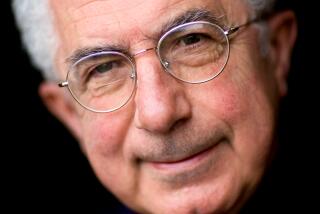Voice of Villainy
Jeffery Deaver shouldn’t be a reasonable man. His novels are marked by mayhem: torture, psychological disorder and a horrifying, if creative, range of violent death. He has written about kidnappers and psychopaths, all with a sense of enjoyment--of absolute relish--that makes one wonder what the 48-year-old author likes to do in his spare time.
Yet, reached by phone at his home in suburban Virginia, Deaver seems downright easygoing and thoughtful as he discusses the thrillers he has written since the early ‘80s at the rate of nearly one a year.
“When I sit down to write, I’m very calculated about it,” he admits in a measured tone. “My goal is to write a fast-paced, seat-of-the pants novel, and I try to come up with the most terrifying situation I can.”
His equanimity may be all the more compelling because it comes across long distance while everything else about his voice on the phone seems somehow disembodied, even somehow deracinated, bearing only a trace of his Midwestern roots. In many ways, though, such a conversation is entirely appropriate, since his last two novels --1997’s “The Bone Collector” (Viking Penguin) and its recently released follow-up, “The Coffin Dancer” (Simon & Schuster)--revolve around a quadriplegic detective, Lincoln Rhyme, whose restricted circumstances basically have taken him out of the physical world.
Once the New York Police Department’s head of forensics, Rhyme now operates from a specially outfitted bedroom in his Manhattan brownstone, where he relies on a battery of high-tech devices not just to carry out his investigations but also to survive. It’s an idea that smacks of a certain gimmickry. Yet while Deaver acknowledges the impulse, he insists that more essential is “the broader issue of a character who is his mind before anything else, which in a way we all are. Rhyme operates independent of physical prowess, independent of race, independent of gender. He really is his mind.”
The notion of a thriller motivated by mind may seem at odds with the more visceral requirements of suspense fiction, but in Deaver’s view, that’s precisely the point. His intention is to write books that use the balance between thought and action to operate on a couple of levels at once.
On the one hand, his writing is tautly plotted, with dramatic sequences that unfold quickly, almost spasmodically: “The Coffin Dancer” pits Rhyme against a hit man out to kill a cluster of grand jury witnesses before they can be deposed, while “The Bone Collector” involves a psychopath whose atrocities mirror those of a murderer who terrorized 19th century New York.
At the same time, the Rhyme novels also function as elaborate cat-and-mouse games, where much of the tension evolves from the machinations of intellect. There’s more at work here than Rhyme’s status as a quadriplegic, although his nearly superhuman leaps of logic--”his skill,” as Deaver puts it, “at making deductions no one else does”--are highlighted by his inability to perform even the most basic physical tasks.
But equally important is the level at which Rhyme engages with his adversaries, a process that informs both his pursuit of the Coffin Dancer and the grisly way that, throughout “The Bone Collector,” he (or, more accurately, his partner, Amelia Sachs, who serves as his proxy) finds clues at each crime scene that lead him to the next. His investigations are presented very much as contests, with detective and criminal trying to outguess each other at every turn.
To make this work, Deaver spends a lot of time on his villains, who often end up as significant characters in their own rights. As “The Bone Collector” and “The Coffin Dancer” progress, we eat with them, sleep with them, live with them; we get inside their memories, their emotions, until we know the pathological patterns of their lives.
Partly, Deaver suggests, this is a dramatic device, a way of ratcheting up the tension, since by cutting back and forth from one point-of-view to another, he can let his readers know what’s coming before his characters have a clue.
But more to the point is the issue of conflict, which Deaver sees as essential to fiction in general, and to thrillers most of all.
“My books are based on conflict,” he explains. “A story, for me, involves believable characters in a conflict that is ultimately resolved for good or evil.” This, of course, requires that the villain be a worthy antagonist, a factor Deaver thinks too many suspense novelists overlook.
“One of the problems in contemporary thrillers,” he argues, “is the neglect of the bad guy. Unless we have a living, breathing villain, our hero has nothing to push against. When I create my villains, I want them to be like Stephen Kall in ‘The Coffin Dancer,’ the guy sitting at the coffee shop next to us, who is playing with his hands. Or the Bone Collector, who is the fellow driving the cab we get into. This leads me to the settings of the crimes, places we all go at various times--we all get into cabs, or go to laundry rooms late at night. I love villains. They are fascinating to me.”
With all their emphasis on crime and investigation, it’s tempting to think of Deaver’s novels as mysteries, an impression encouraged by Rhyme’s hard-boiled personality. Yet despite these touches, “The Bone Collector” and “The Coffin Dancer” don’t really qualify as detective fiction, since what drives them is not the question of who or why but, rather, the more explosive issue of how everything will be resolved.
It’s not that Deaver has anything against the mystery genre; as a kid, he was a devotee of Agatha Christie and Sir Arthur Conan Doyle, and during the 1980s he wrote a series of “smaller mysteries” set in downtown New York. Still, the mystery’s status as something of an intellectual puzzle makes it, in his view, a limited form.
“Ultimately,” Deaver notes, “a mystery answers the question of what happened. In a mystery, the body is found in the first chapter, and the detective solves the crime.” The problem is that crime-solving “didn’t really interest me. It didn’t let me get into the emotional experiences I want people to have. Reading a book should be a compelling emotional experience, and I will do whatever I can to keep readers turning the pages, to up the ante, to make them sweat.”
A Thrill Ride Between Covers
At the heart of this endeavor, Deaver believes, is a force we might call primal fear, the elemental mix of thrill and terror that motivates so many forms of entertainment, from skydiving to horror films. Deaver, in fact, likens the appeal of books like his to that of an amusement park, where we experience a controlled form of risk-taking, secure in the notion that we’ll remain unharmed.
“Look at a roller coaster. We like to sit down in a little cart that hurtles us at 80 miles an hour down a precipice and turns us upside-down and so forth. There’s really no logical reason to like that. . . . That’s what I try to do with the books--tap into primal fear of some kind.”
This can be tricky, for one of the conventions of the thriller--or the mystery, for that matter--is that the hero gets away unscathed. Deaver, though, likes to play with these expectations: In his novel “A Maiden’s Grave” (Viking Penguin, 1995), one central character ends up murdered, and the Rhyme books have a sense of jeopardy that more than once threatens members of the investigative team. Even Rhyme faces his share of uncertain situations, from medical emergencies to affairs of the heart.
“There are lots of ways to introduce danger into a book,” Deaver says. “Death is only one and not necessarily the worst.”
For all that, don’t expect Rhyme to undergo anything too drastic, especially since Deaver has what appears to be a franchise on his hands. This fall, Universal Pictures will begin production on a screen version of “The Bone Collector,” starring Denzel Washington, and, meanwhile, Deaver already is planning a third book in the series, which could go on for quite a while.
“I do not want to write only Lincoln Rhyme books,” Deaver cautions, and, in fact, his next novel, which he already has completed, has nothing to do with the detective in the wheelchair. But, he says, “Ideally I would like to do every other book a Lincoln Rhyme book, as long as this is something readers want.”
More to Read
Sign up for our Book Club newsletter
Get the latest news, events and more from the Los Angeles Times Book Club, and help us get L.A. reading and talking.
You may occasionally receive promotional content from the Los Angeles Times.







